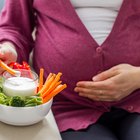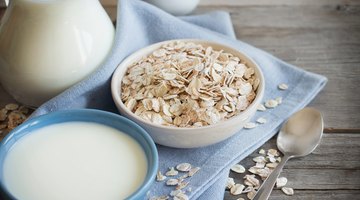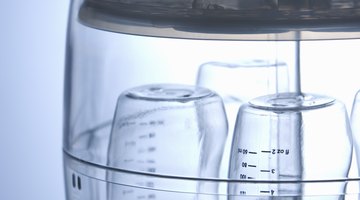Can Pregnant Women Drink Ultra-Pasteurized Milk?
Drinking milk and eating dairy products during pregnancy helps supply the necessary amount of calcium for proper fetal growth. Pregnant adults require about 1,000 mg of calcium per day, while pregnant teenagers need about 1,300 mg, according to the National Institutes of Health. Both pasteurized and ultra-pasteurized milk products provide a healthy method of obtaining this important mineral.
Calcium
During pregnancy, you and your baby require calcium for the growth and maintenance of strong teeth and bones. This mineral also plays an important role in supporting the health of your nerves, muscles and circulatory system. Many milk products are fortified with vitamin D, another important nutrient necessary for the proper development of your baby’s bones.
Pasteurization

Can You Drink Homogenized Milk When Pregnant?
Learn More
The Centers for Disease Control and Prevention warns that pregnant women should consume only pasteurized dairy products. Pasteurization is a process that destroys the germs that are otherwise sometimes present in milk. This process involves heating the milk to a minimum temperature of 161 degrees F for 15 seconds or more, or 145 degrees for at least 30 minutes. For milk and other dairy products to be considered properly pasteurized, their handling and packaging also must meet certain sanitary requirements.
Ultra-Pasteurized Milk
Ultra-pasteurized milk takes the decontamination process one step further by providing a higher temperature that reaches a minimum of 280 degrees F for a minimum of two seconds. The more stringent packaging requirements also result in a more sterile product. Unlike regular pasteurized milk that lasts for to 21 days after processing, ultra-pasteurized milk may keep for up to 90 days after processing, as long as the container remains closed. Once you open the ultra-pasteurized dairy product, however, you should use it within 10 days.
Precautions

Can Pregnant Women Eat Yogurt Instead of Milk?
Learn More
Ultra-pasteurization provides safe dairy products that pregnant women and others can consume. Avoid keeping an open container of ultra-pasteurized milk in your refrigerator longer than 10 days. Consuming about three servings of dairy products per day, while including a variety of other foods, can help you meet your nutritional requirements during pregnancy. If you are lactose intolerant, ask your doctor about taking calcium supplements or making food substitutions that will help you obtain adequate amounts of calcium during your pregnancy.










